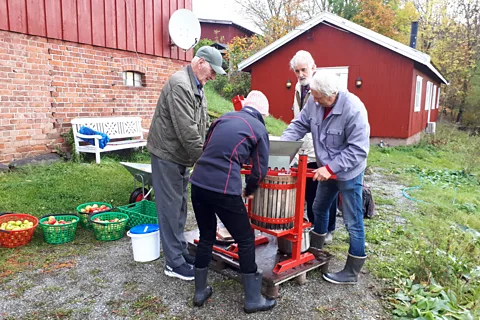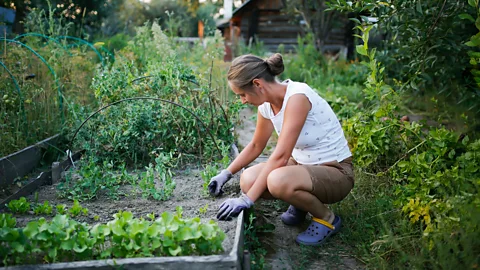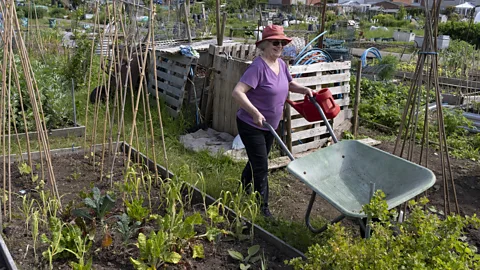How gardening can help you live better for longer
 Getty Images
Getty ImagesResearch shows gardening preserves cognitive function, helping you live well for longer. Now, dementia patients are reaping the benefits with "care farms" prescriptions.
Marianne Rogstad, a retired grandmother from Norway, is a lifelong learner. She worked as a hotel clerk in Switzerland for five decades, where she spent her days immersed in new languages and cultures.
But when Rogstad returned to Norway, she was diagnosed with dementia. She soon became isolated and lost those sources of stimulation. That was until she joined Impulssenter – a small "care farm" outside of Oslo. The care farm borrows its name from the way it serves people's impulses to work and connect with others, says Henreitte Bringsjord, whose parents founded the farm.
Five minutes to stay young
From reading a page of a book every day to knee-strengthening exercises, this series looks at simple lifestyle changes you can make now that will have a big impact on how you age. The best part? They all take less than five minutes.
"My mum and dad loved farm work, and they thought about how hard it is for people with dementia to stop working and lose their social life. So, they wanted to help people with dementia become a part of life again," says Bringsjord, who now co-manages the farm.
In 2015, Norway became one of the first countries to create a national dementia care plan, which includes government-offered daycare services such as Inn på tunet – translated as "into the yard" – or care farms. Now, as researchers recognise the vast cognitive benefits of working on the land, more communities are integrating gardening into healthcare – treating all kinds of health needs through socially-prescribed activities in nature, or green prescriptions.
 Henriette Bringsjord
Henriette Bringsjord"Nature prescriptions can increase physical activity and social connection while reducing stress, which have multiple positive knock-on effects for blood pressure, blood sugar control and healthy weight, reducing the risk of diseases that can lead to dementia," says Melissa Lem, a family physician based in Vancouver and researcher at the University of British Columbia, Canada – where she examines the opportunities and barriers around nature-based prescriptions. "We all know that more physical activity improves mental and physical health, but gardening supercharges those benefits," she says.
New data sheds light on the advantages of spending time gardening. In a first-of-its-kind study, researchers from the University of Edinburgh investigated if there might be a link between gardening and changes in intelligence our lifetimes. The study compared the intelligence test scores of participants at age 11 and age 79. The results showed those who spent time gardening showed greater lifetime improvement in their cognitive ability than those who never or rarely did.
"Engaging in gardening projects, learning about plants and general garden upkeep involves complex cognitive processes such as memory and executive function," said Janie Corley, the study's lead researcher, in a press release.
Corley says some of those benefits may come from the "use it or lose it" cognitive framework, a theory that suggests the strength of our mental abilities in older adulthood depend on how frequently we use them. When we neglect to perform tasks that stimulate certain parts of our brain, those parts of our brain begin to lose their functionality, but regularly engaging in these activities – such as problem solving, learning a new skill or being creative – in older adulthood can have the opposite effect.
One 2002 study of more than 800 nuns in the United States found that frequently participating in cognitively stimulating activities reduced their risk of Alzheimer's disease. A more recent study of older adults in Japan found participation in meaningful activities could protect against declines in memory function. Meanwhile, other research has found that people who received an intervention of cognitively stimulating activities, typically in a social setting, saw improvements in cognition, mood, communication and social interaction.
 Getty Images
Getty ImagesAnd gardening appears to have specific cognitive benefits. For one thing, gardeners seem to experience gains in the nerve levels of brain-derived neurotrophic factor (BDNF), a protein that plays an important role in the growth and survival of neurons. They also receive boosts to their vascular endothelial growth factor (VEGF), a protein associated with improving cognitive functioning.
One 2006 study from the University of New South Wales, which followed Australian men and women throughout their sixties, found that those who gardened on a daily basis had a 36% lower risk of developing dementia than those who didn't. Gardening has also been shown to improve attention, lessen stress, reduce falls and lower reliance on medications.
Some of these cognitive benefits may come from simply being in nature. Roger Ulrich, a world expert in designing health systems and a professor of architecture at Chalmers University in Sweden, was among the first to connect nature exposure to stress reduction. Throughout the 1980s and 1990s, he conducted a series of landmark studies demonstrating how simply looking at trees and other plants – even through a window – can reduce pain, boost positive emotions and strengthen concentration.
Ulrich suggested that these responses were driven by evolution. Since the ability to recover from a stressful situation was favourable for survival, the tendency to recover from stress in natural settings was genetically favourable, passed down through generations, and could explain why even just small doses of nature can improve wellbeing among modern humans.
More like this:
• Quick home health tests: Check your reaction times
• Meadowscaping: The people turning their lawns into meadows
• Sit-to-stand: The simple test that reveals how well you’re ageing
Some data seems to support the theory that we evolved to recover and heal more effectively when surrounded by nature. Lem similarly suggests some of these benefits come from our evolution – how our brains are drawn to settings with high biodiversity because they're optimal for survival. "The effects of nature are so powerful that breaking it down into its components – whether it's looking at images of nature, listening to the sounds of nature, or smelling nature – can also significantly improve our health," says Lem, who recently piloted a first-of-its-kind nature prescription programme with an art institution in Canada.
In addition to stress reduction, Lem suggests that being immersed in nature might help to improve focus. According to Attention Restoration Theory, our brains have a finite capacity for directed attention in busy urban settings, and nature helps to counteract this, she explains.
 Getty Images
Getty ImagesLem suggests that the health benefits of gardening may also come from the way it lends itself to other health-promoting behaviours, like physical activity. She points to two studies of US adults – one that found those who gardened for more than one hour per week had a 66% lower risk of cardiac arrest, and another that found gardening was a "strong and independent predictor of positive bone density". Gardening can help people to develop greater hand dexterity, muscle mass and aerobic endurance, as well as promoting increased mobility.
Still, for people who already have dementia, research suggests these benefits hold extra value, improving mood, behaviour, ability to communicate and function more than other activities. Now dedicated care farms serving people with dementia are cropping up around Europe, and in the UK.
Bringsjord believes that gardening at care farms can provide a sense of agency and independence. "People love it because they can see the results of their work," she says, adding that since gardening and farm work lends itself to group observation, people who struggle with memory loss may have an easier time following along. "If they forget how to do something but then see what the other workers are doing, they remember how to do it themselves."
And, even with all of the demonstrated cognitive benefits of gardening and being outdoors, Bringsjord doesn't overlook the importance of simply creating a positive environment – filled with both people and plants – for people like Rogstad. "They could go home and be really happy, and then their spouse could ask 'What did you do today?', and they could have no idea except for the fact that they had a good day," says Bringsjord.
That's true for Rogstad, who now spends three days per week at the care farm – planting vegetables, feeding cows and tending to chickens – and appreciates the simplicity of the work. "It's nice to be out here in nature. It's much better than sitting at home."
--
For trusted insights into better health and wellbeing rooted in science, sign up to the Health Fix newsletter, while The Essential List delivers a handpicked selection of features and insights.
